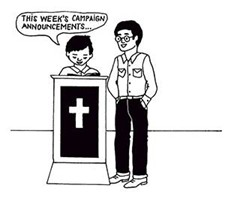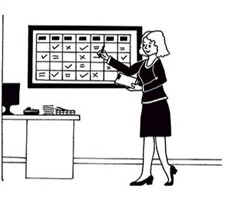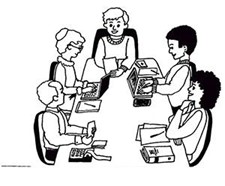PREPARATIONS
Congregational Preparations
A congregational preparation period of 6 weeks should precede the actual home meetings. During these 6 weeks the following activities should be completed:
Sermons

Your minister is fully qualified to develop and present an appropriate 6-week series of sermons related to your DIY Church Capital Campaign. Some ministers love this and other hate it, but they all can present sermons on giving. These sermons are not to pressure people to give, but are rather reminders of the power of prayer. The minister does not need to ask people to give. The minister’s job is more important. The minister will ask people to go to God in prayer for guidance in establishing their pledge. Once again, this may be different than expected as it is dramatically different from traditional campaign one-on-one approaches.
Trust your minister to do an excellent job in this endeavor. Your minister will be praying for God’s guidance in the creation of these sermons.
Church Member Prayer Preparation Presentation Announcements

This is an important way to involve the congregation. Every Sunday during this 6 week preparation period a member of the congregation stands and reads their assigned announcement. These announcements are intended to be read word-for-word for the following reasons:
- Each announcement is designed to be read in less than two minutes so it will not impinge on the rest of the service. This requirement makes the presentation easier for those who are uncomfortable with public speaking. This requirement also limits the church member who would love to personally give a half hour sermon.
- Each announcement begins by reminding everyone that they should be praying about the upcoming capital campaign.
- Each announcement shares a scripture to communicate God’s thoughts on giving. These scriptures can be changed to scriptures more appropriate for your church, but the body of the announcement should remain unchanged.
- Each announcement explains how the campaign will operate.
It is vitally important that no one says “I didn’t know we had to turn in the cards tonight.” Even if you think this is unnecessarily repetitive, please have it done every Sunday for this 6-week period. Trust me on this; it will make the home meetings more successful and will go a long way in avoiding a disaster.
Home Meeting Scheduling

Many churches assign this task to the Church Secretary. If you have a congregation of 200 you will probably have less than 2 dozen meetings. Many churches already have weekly fellowship meetings; thus, the Prayer-Oriented Home-Group meeting becomes an additional item on the agenda of the usual home meeting. Each family or giving unit should receive a personalized invitation. These can be completed by the church secretary or scheduling volunteer and placed in a mailing envelope. To reduce mailing cost, they can be personally distributed after a church service 3 or 4 weeks before each home meeting. Those invitations that cannot be personally distributed can be mailed the following Monday morning. I know these large envelopes will require extra postage, but the vast majority will be personally distributed Sunday morning. For those not in attendance at their home meeting and for those who are not a part of a home fellowship group a special follow-up meeting should be scheduled at the minister’s home or midweek at the church. For homebound or shut-in members this same presentation can be taken to their residence the same as delivering communion. Don’t exclude anyone as everyone of your church members has the right to be involved in this church activity. Presentations to a nursing home resident are still confidential, thus no one is put in an awkward situation. You will never reach 100% of your members, but if someone is inclined to skip an assigned home meeting and a follow-up meeting, they probably would not be a major donor. Don’t worry about the few that are missed; you will still exceed your expectations.
These meetings should be scheduled as close together as possible.
Multiple meetings can be completed on the same night making it possible to complete all scheduled meetings in a week to 10 days. I have completed the corporate equivalent of this approach with over 900 meetings completed in less than two weeks. Some church members are still going to expect this campaign to take several months or more. Surprise them!
Post-Campaign Meeting of Elders and Campaign Accountant

In the near future, obtaining pledges will be completed and it will be time for a Post-Campaign meeting of Elders and your Campaign Accountant. Once you have contacted more than 90% of your potential prospects, a special Elders meeting with the Campaign Accountant is in order. Of course, the Campaign Accountant has not disclosed any numbers yet, but they will know how successful the campaign has been. With this information the Campaign Accountant can provide general guidance for the Elders to consider.
While exact numbers should not be given at this Elder’s meeting, the Campaign Account can identify a general trend.
The Victory Praise Celebration

A Victory Praise Celebration should be scheduled as soon as possible after the last home meeting (with a week or two at the most). At this time only the Campaign Accountant knows the final total of the campaign. A couple of days before this meeting the Campaign Accountant should meet with the Elders to provide a general indication of the campaign’s success. Many churches have an evening congregational dinner as part of their Victory Praise Celebration. I recommend that you expand on the attached “Proposed Initial Victory Praise Celebration Agenda”.